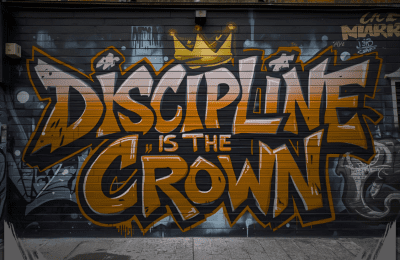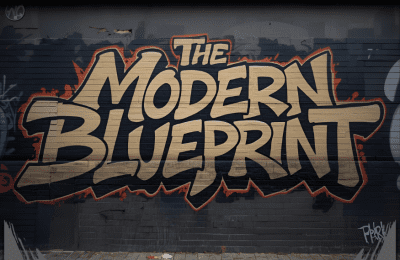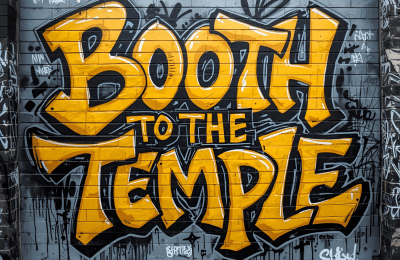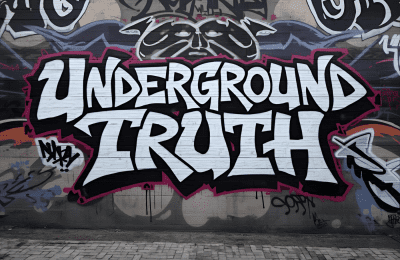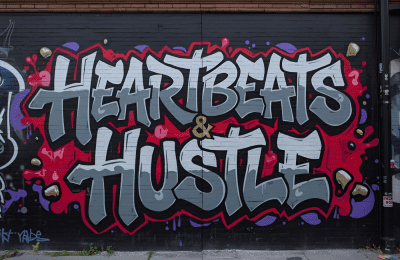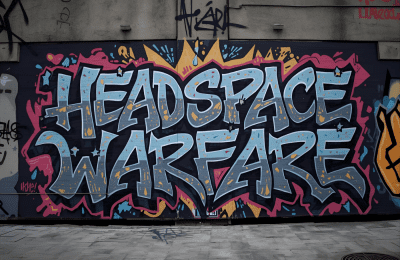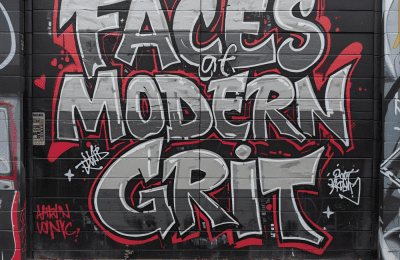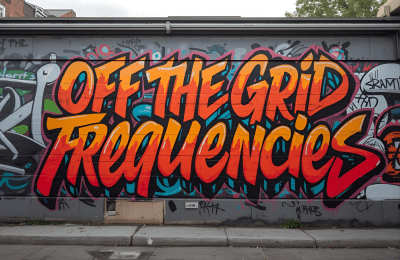Released on September 26, 2025, in Whippany, United States, the confrontational, non-fussy, and in-your-face ride of Mixed Media Art (MMA) Volume 3 by David Potter is a combination of hardcore hip-hop grit, pop-trap hooks, and brash commentaries on the combat sports and pop culture world. This project is a breakthrough, as the titles such as Charlie Kirk, Hulk Hogan in Hell, Where Ronda Rousey Lost her Fine Ass, and Fuck Disney show that Potter does not fear taking a seat, goes into the ring, and strikes heavy blows.
Since the opening disc with its first notes up to the 17 tracks finale of Disc 2, Volume 3 does not fail to make its intentions known: provoke, entertain, challenge. There is a self-reflective, confrontational tone to the voice of Potter, a combination of his combat-sports character with an unaccounted musical aspiration. It is not smooth commercial rap that wants to reach the radio only – it is a collision: of comedy and criticism, trap music and rock guitars, pop melody and rap swagger.

The groundwork was laid by his former books; this time Potter raises the stakes. The sonic palette is broad: hard-rock spirit is accompanied by R&B choruses, full-scale trap bangers are bruised with glimpses of synth-pop. But what the EP carries, technically this is what they call a full album, is the view of the world, one that has been influenced by battles, back-firing, celebrityhood, and the love/hate affair with the spectacle of MMA and entertainment which is strange.
He does not dodge behind figurative language. He names names. He reveals the background of the arena, murky lights, and the strobing of the promotion machine cameras. His autotune is not only melodic but also to distort and ridicule the hyper-market of celebrity athletes. He leans then to commercial pop touches but then swings to something raw.
This release will seize you should you be a hip-hop lover who savours your lines filled with punchlines and your beats filled with irony. Should you like the kind of deep contemplation that is not very loud, you probably will feel overwhelmed by the loudness. In any case, Potter sees very clearly and is not apologetic.
David Potter has his roots in the United States, in Whippany, where not many people expect to find any breeding ground of genre-bending rap/pop hybrids. But that is the geographical external standpoint which gives him liberty: he is no longer held to coastal expectations, he is free to experiment. His background is in the combat sports entertainment. He is no longer a commentator, wrestler character; with this album series, he is placing himself as a creator that borders sport, music and performance.
Volume 3 has been called his last comedy album in the MMA field – his effort to leave a legacy of unmediated satire and comment. It is a sequel to Volume 2, which received acclaim in that niche due to its radical mixture of humor and criticism. Note: According to the press release, this latest instalment has been referred to as the most daring and complete work so far.
What drives Potter? On the one hand, it is the spectacle of MMA, macho, brands, warriors, and hype. At a different plane, it is the preposterousness of it all the deals, the endorsements, the media circus. He picks up the drama of combat, turns it into music: grave at times, absurd at others, always overlaid with a wink of the knowing eye.

The influences are eclectic musically. You feel the swagger of commercial pop-rap, the grit of rock and hard rock guitars here and there, the bouncing of trap Beat, and even some Broadway-style theatrics (which his press materials mention). It feels like he has picked up pieces of rap-rock crossovers of the early 2000s, the autotune-pop of the present, as well as the sports entertainment hype music of arenas. The outcome: a random yet purposeful extravagant hybrid.
It was recorded in New York City, and the collaborators included the broadway singers as well as country rock singers to the rap producers. The album eats that desire, you listen to changes of tone, you listen to attempts to cross genres, you feel that Potter is pushing himself and team members. Not small, it is pompous, even melodramatic. In his quote, he aimed at love-letter not only to martial arts, but to all arts. That is the motivation of much of the overlaying and the brashness.
In this release you can feel his experience: he moved through the world of athlete/entertainer to musician, through the world of the lighting of wrestling-arena to the world of the mixing in a recording-studio. The dreams of his lifetime nightmare became art are in the anguish and humor and swagger of this record. In case this is his last word in this series, Volume 3, it is evident that he wanted to make a bang.

Reckoning is the basic assumption of The Miseducation of MMA Volume 3. Potter calculates with his place in the combat-entertainment industry, calculates with the nonsense of professional athletes, the entertainment scripts, the business and love of business in sport. However, he is also counting on himself, his old self that he mentions in the titles of the songs such as Chapter Seven: Defying The Old Me.
Thematically, the album is consistent to spectacle, conflict, ego, redemption and the reflection between the personal and the public. On one layer you get the allusions to such figures as Charlie Kirk, Hulk Hogan, Ronda Rousey, Conor McGregor, Khabib Nurmagomedov names obtained in the sports/celebrity pool. But he does not use them to praise: what are we applauding? What are we buying? Whose side when the battle is finished?
You can hear in music the changes that are associated with these themes. The trap-pop bangers are addressed to the hype machine. The rock-charged songs address the fight-crazed fight nights. Passages of more inward-looking suggest the self-critique. The description of the album as the final exam or the final section of the beginning produces an impression that Potter is closing up a saga. There is a feeling of closure, introspection, yet there is also rebellion.

Notably, the project is business but urgent. It employs the pop hooks and mainstream production and subverses it with sharp lyrics and satire. The message? The spectacle of modern combat sport (and by implication, modern media) should be celebrated and criticized. Potter does not conceal the contradictions. He leans into them.
Overall, Volume 3 is a grandiose canvas: a kind of fight-anthem, a kind of confession, a kind of social comment. It is chaotic here and there–but on purpose. This is not the place to gamble, as it is a polish that is not risky. This record will be with you in case you are willing to take a daring step of combining genres and worlds.

Tracklist & Breakdown
Here is a breakdown of the major portions (Disc 1 and Disc 2), focusing on key tracks that define the journey.
| Track | Time | Breakdown |
|---|---|---|
| Introduction. Beginning of the End | 4:24 | The opener sets the tone: cinematic strings or samples, a crisp hook, Potter’s voice declaring this is the culmination. It establishes stakes and the fight motif. |
| Welcome Back! | 6:53 | Big production, anthemic beat. Potter re-enters the arena—metaphorically and literally—welcoming the audience to his world, triumph and scars in the same breath. |
| Chapter One. Noone Will Mourn This Asshole | 3:10 | Sharp, almost punk-rap aggression. Short, swift, biting. The title speaks volumes: defiant and raw. |
| Charlie Kirk | 4:35 | Direct reference to a public figure; uses satire and punchy wordplay to inspect fame and performance. Beat drops heavy, chorus sticks. |
| Chapter Two. Make Peace With The Past (Back to Emerson) | 4:00 | A moment of reflection. Soulful samples, a slower tempo. Potter looks back, chooses to reconcile rather than fight. |
| Popular (It’s Wicked) | 6:17 | Catchy hook, feels radio-ready, but with lyrics that undermine the chase for popularity and fleeting fame in fight culture. |
| Legends | 6:18 | Big drums, guitar riffs, celebratory tone—but underlying critique of who gets labelled “legend.” Potter questions the criteria. |
| Chapter Three. Dana White and Me! | 4:39 | Name-dropping the UFC boss, this track merges ego with irony. High energy, tongue-in-cheek braggadocio refocusing to deeper issues. |
| Welcome to the Fight World | 6:48 | Full arena feel: crowd noise, fight-bell samples, heavy bass. The sonic embodiment of stepping into the ring. |
| Chapter Four. Midterm Medley | 5:12 | A multi-part movement: shifts between styles, almost orchestral in ambition. Potter shows range. |
| Chapter Five. Welcome to the Big Leagues! | 6:18 | The start of Disc 2: big swagger, big beat. He claims the top tier. Production mirrors the ascent. |
| New King in Town (Like MMA Guru) | 5:28 | Trap beat locked in. Potter plays with prophet imagery, flips it to promotional king. Hook catchy, lyrics sharp. |
| I’ll Take The First Question | 3:42 | Shorter, more direct. Listener gets the Q&A style metaphor: what’s next? Potter answers with spine. |
| Chapter Six. Do Another Line | 3:21 | Darker tone. References to hedonism, fall-from-grace, the cost of the spectacle. Bleak but compelling. |
| Fuck Disney (The UFC & ESPN Story) | 4:04 | Title says it all: critique of corporate partnerships, sanitized fight-world image. Funky beat, pointed lyrics. |
| Cocaine like Conor McGregor Everyday! | 4:39 | Fast tempo, almost reckless energy. Potter portrays the chaos behind the fighter lifestyle. |
| Chapter Seven. Defying The Old Me | 4:18 | Self-redemption theme. Musically calmer but still punchy. Shoulder-tap beat, introspective flow. |
| Conor McGregor vs. Khabib Nurmagomedov | 4:49 | Breakdown of a fight-icon clash, mirrored by Potter’s own internal battle. High-octane beat with lyrical detail. |
| Send to Dagestan and Forget | 3:58 | Shorter track, staccato flow, sharp punctuation of an ending. |
| Duck Tom Aspinall | 2:40 | Quick interlude or comedic break. Minimalist beat, punchline heavy. |
| Where Ronda Rousey’s Fine Ass At? | 4:43 | Provocative title, more layered than at first glance: gender in fight-culture, objectification, persona. Catchy hook hides sharp commentary. |
| Jake Paul Fixes Everything | 3:50 | Satirical bounce. Commercial influencer meets fight world: curtain pulled back. |
| Lets Get Juicy (The Steroids Disco Song!) | 4:58 | Disco-inflected beat, ironic lyrics about performance-enhancement culture. Track stands out musically. |
| Hulk Hogan in Hell? | 3:11 | Playful but dark. Wrestler icon in inferno metaphor. Fast, chaotic, fun. |
| Chapter Eight. I Am the Whole Fucking Show | 4:49 | Braggadocio meets reflection. Potter owns his spotlight but acknowledges its cost. |
| The Final Exam | 7:51 | Longest track yet. Grand production, layered instrumentation, Potter sums up the journey: fight, fame, fall, rise. |
| Chapter Nine. End of the Beginning | 11:31 | Epic closer. Over eleven minutes. Acts as coda and prologue: the end of this chapter, the start of whatever comes next. |




